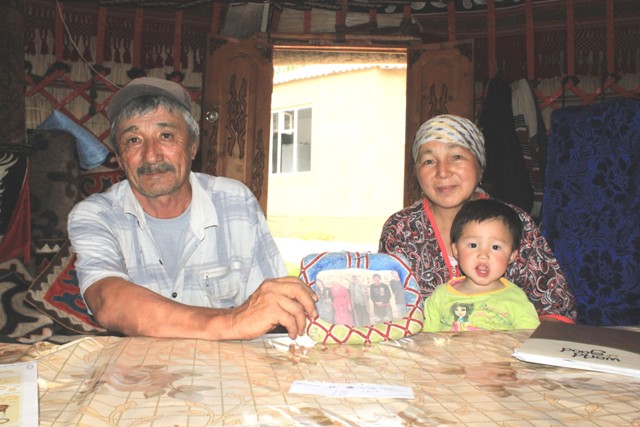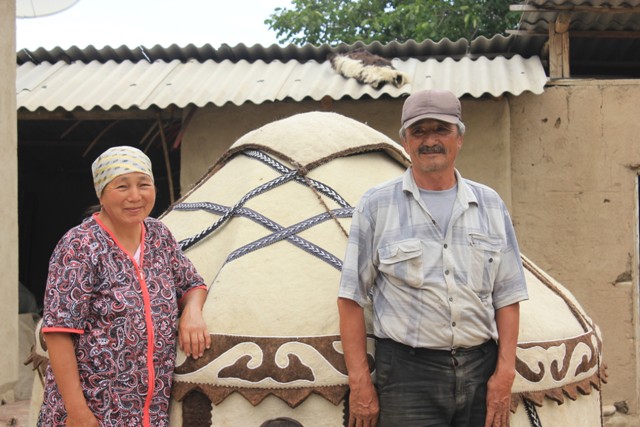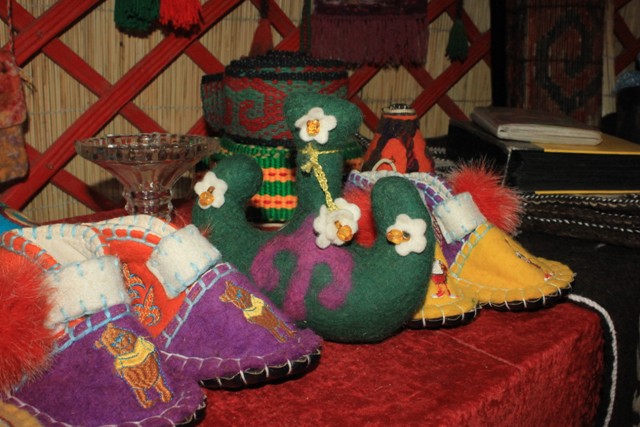Kompanion client Kulbar Toksombaeva is a small town business mogul in rural Kyrgyzystan.
Based out of the small village of Kyzyl-Tuu on Issyk-Kul’s southern shore, Kulbar and her family have managed to turn two of the family’s four small businesses into international successes. Through a combination of business savvy and hard work the Toksombaeva family have developed their businesses while also fueling their local economy.
The secret to her success? Microloans.
But Kulbar’s career as an entrepreneur wasn’t a deliberate choice. Like so many other small business owners in Kyrgyzstan today, Kulbar and her husband both held steady jobs under the Soviet Union. The couple lived in Balykchy, a city at the western edge of Kyrgyzstan’s famous Issyk-Kul lake, where Kulbar was a hairdresser and her husband was a driving instructor.
Kyrgyzstan’s independence in 1991 forced the family to move the village of Kyzyl-Tuu, on Issyk-Kul’s remote southern shore, where her husband’s family lived.
Despite the major disruption, they were quick to turn their luck around. By hedging their bets on their knowledge of traditional craftsmanship and solid business sense, Kulbar and her husband were able to invest in their future with the help of microloans.
Balancing multiple businesses
Kulbar was quick to smile when she invited us into a yurt that she and her husband built by hand. Each year the couple constructs dozens of the traditional Kyrgyz houses for clients in Europe and North America, many of whom use them as novelty hotel rooms.
“People pay more money to stay in a yurt in France than they do in Kyrgyzstan!” Kulbar said, laughing.
Her goal is to sell their yurts abroad while also attracting tourists to Kyrgyzstan. The family also runs a small tourism business, handicraft manufacturing and a small gardening enterprise.
At their property in Kyzyl-Tuu the family offers tourists the chance to immerse themselves in Kyrgyz culture. During two-hour shows that include yurt-building demonstrations, cheese-making tutorials and handicraft demonstrations, Kulbar and her family spread their knowledge of Kyrgyz culture to adventurous tourists from all over the world.
And for dinner? Fruits and vegetables from their garden, mutton from the flock up the hill and fresh kumis (fermented mare’s milk) from local horses.
Keeping business local is what Kulbar’s family does best. By buying the felt for their popular handicrafts from neighboring producers, and by buying wood for yurt construction from local suppliers, the Toksombaeva family directly supports the local economy.
When their business profits, the whole community does, too.
Kulbar and her husband first heard about Kompanion’s microloans in 2009 from their neighbors. Today she belongs to a loan group of six women in Kyzyl-Tuu and her husband belongs to another loan group. They realized early on that taking microloans would require smart investments and good bookkeeping.
Now on her fourth loan cycle, Kulbar and her family live very comfortably. During each loan cycle they increase the amount of money they borrow.
The reason?
Kulbar is always working hard to expand her business. With each loan increase, she uses the money to stretch her talent for hospitality and handicrafts a little bit further.
Because the family has developed such a solid business and repayment plan, they have had no difficulties with loan repayment. They are now on their fourth loan of 4,500 som (USD $94).
Kulbar attributes their successful loans to her care of the family’s accounting. Their business’ success has meant that they now have constant yurt orders from France and England.
From Kyzyl-Tuu to Santa Fe.
The Toksombaeva family’s business success is a testament to the power and potential of investing in Kyrgyzstan’s rural entrepreneurs. One decade ago, Kulbar and her husband were budding small business owners, and today they manage international contracts with European and American clients.
One American client from Santa Fe, New Mexico, lives in his yurt year-round.
In addition to their business in Kyzyl-Tuu, Kulbar and her husband display their yurts and handicrafts in exhibitions across the world. Over the past eight years, the family has traveled to folk craft exhibitions in Santa Fe, New Mexico; Edinburgh, Scotland; Budapest, Hungary; and Istanbul, Turkey to display their products.
They use the exhibitions as opportunities to advertise their local tourism business, too, which, in turn, brings in business for other entrepreneurs in the region.
Kulbar and her family are also members of the Central Asian Crafts Association (CACSA), based in Bishkek, who advertise for them, and are active participants in Kompanion’s annual community development activities.
Clearly they are doing something right.
When asked what has made them so successful, Kulbar smiled and provided a simple answer.
“We work hard,” she said.
“Kyrygzstan is a country of clean water, eco-safe fruits and vegetables and beautiful mountains. I welcome people to come and see,” said Kulbar when asked what she wished to share with the world.








